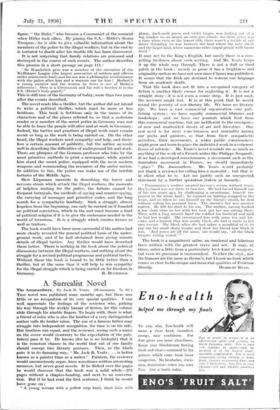A Surrealist Novel
The Arnaranthers. By Jack B. Yeats. (Heinemann. 7s. 6d ) Tuts novel was published some months ago, but there was little or no recognition of its very special qualities. I can well appreciate the feelings of the reviewer who, picking his way through the weekly bazaar of fiction, let this volume slide through his nimble forgers. To begin with, there is what a friend of mine who is also the brother of a very distinguished author calls the brother taboo. The son of a famous father may struggle into independent recognition, for time is on his side. But brothers run equal, and the reviewer, seeing such a name on the cover would (contrary to the expectation of the pub- lisher) pass it by. He knows (for he is no biologist) that it is the remotest chance in the world that out of one family should emerge two literary geniuses. Then, as the blurb puts it in its damning way, " Mr. Jack B. Yeats . . . is better known as a painter than as a writer." Painters, the reviewer would unconsciously argue, have sometimes written interesting memoirs, but never good novels. If he flicked over the pages he would discover that the book was a solid whole-273 pages without a chapter-heading, and next to no conversa- tion. But if he had read the first sentence, I think he would have gone on : " A young woman with a yellow mop head, short hair, with
glossy, duck-neck green and violet tinges, was looking out of a top window on an island, an only-just island—for there never was a time when even at the lowest ebb, there wasn't a trickle of salt water threading its way between the land where the lady dwelt. and the larger land, where numerous other stupid people with bands lived."
It may not he the King's English, but surely there is a com- pelling freshness about such writing. And Mr. Yeats keeps it up the whole way through. There is not a dull or tired patch in the book ; merely as prose it has a brightness and originality such as we have not seen since Ulysses was published. It seems that the Irish are destined to redeem our language
from an academic death.
That the book does not fit into a recognised category of fiction is another likely excuse for neglecting it. It is not a straight story—it is not even a comic strip. It is just mad, the reviewer might feel. It is at this point that he would reveal the poverty of our literary life. We have no literary
life. We have a vast commercial organisation—our pub- lishing system ; we have equally commercial libraries and bookshops ; and we have our journals which feed front
this commercial machine, but are indifferent to the emergence of new and unattended shoots of art and literature. Our real need is for more consciousness and mutuality among our poets and painters, so that from their sympathetic activities, their movements, a wider public consciousness might grow and learn to place the individual work in a coherent frame of referent?. Mr. Yeats's novel reminds me as much as anything of the work of a French writer like Philippe Soupault.
If we had a developed consciousness, a movement such as the Surrealiste movement in France, we should immediately " place " The Amaranthers. Mr. Yeats would probably not thank a reviewer for calling him a surrealist ; but that is
in effect what he is. Let me justify such an unexpected statement by a further quotation (taken at hazard) :
" Ponsamionto's mother awaited her son's return without tears. Her hasband was not there to fuss her. He had fussed himself out of life ten years ago, by challenging a swordsman, himself the poorest in the whole land ; he insisted on fighting stripped to the waist, and so when ho ran himself on the friend's sword, he died without soiling his personal linen. The doctor's lint was another matter. He loft his shirt to his son. The mother, having hooked a low chair close to her with her foot, got her son sitting there, Then, with a long smooth hand sho rubbed his forehead and said he had lost weight. She entertained him with some tea and bis- cuits, and a liqueur that was nearly black, sho had it made to her own receipt. Sho liked, after she had taken a mouthful of it, to pop out her small sharp tongue and show her friend how black it was. And yours are all the same,' she would say, all the black
tongues sitting round.' " .
The book is a magnificent satire, an irrational and hilarious farce written with the greatest verve and wit. It may, at times, suffer a little from a particularly Irish kind of waggery,
but even its grammar is transcendent. Neither the styl::, nor the humour are the same as Sterne's, but I know no book which comes so close to the unique and imincrtal qualities of Tristram,






































 Previous page
Previous page